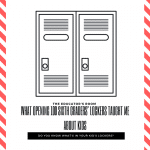Anyone who has taught middle schoolers can tell you – it is a time of abrupt and rapid change for students that can cause uncertainty, self-esteem lapses, and academic performance drops. For elementary schools, we see a lot of focus paid to their structure, pedagogy, and support, as is appropriate for foundational learning. On the high school side, we tend to see that focus brought back around as we worry about dropout rates and college preparedness.
Our middle school tends to be treated like the middle child of education – largely forgotten and especially underfunded. Our middle schools need to be acknowledged as critical to student success, and as such see more robust policies targeting them. There are some out there that have amazing programs and structure, but many still lack what many students need.
There are many challenges that plague middle schools especially. Middle school is a huge transition for students: up until this point in their life, they have most likely been in a school where they spend the whole day and school year with the same teacher, same peers, and experience more manageable class sizes. They may have gone to school with these same peers for years and have established social circles. When they go to middle school, on the other hand, they have teachers for shorter amounts of time, switch classes independently, and experience larger or overcrowded classrooms. Additionally, multiple elementary schools often feed into one middle school which leads to changing social dynamics that can be intimidating or isolating for students. Furthermore, the middle school they are entering may have completely different rules, academic expectations, and procedures that may be difficult for students to adjust to that have spent the last six years in one school with a consistent structure.
Physiologically and emotionally middle school-aged students are changing rapidly, and in ways, they do not understand or feel comfortable. Discipline issues tend to become aggravated at this age – students are growing, hormones are raging, but they still lack the self-regulation strategies needed to overcome these situations. Like any other school, there is a lack of support staff and funding to support students, but for middle school students, this is even more necessary. It may also be valuable to provide training for teachers that addresses the unique needs and challenges our middle school students face.
One of the largest hurdles in middle school policy, in my opinion, is the lack of academic accountability. In middle school, students take important core classes but are not required to pass them. Countless students year after year do not master the material but are allowed to pass through to high school where they will be taking more difficult classes that build on the knowledge they should have received in middle school. This is not the fault of teachers, administrators, or even the curriculum – it’s a policy failure. We show kids that their performance doesn’t matter to move to the next grade, but in high school, we know that is not true. Most critically, we know students who struggle the most in 9th grade are much more likely to drop out of high school. Why do we set our students up for failure right before the most difficult but impactful transition in their educational career? Our middle school students deserve better.
We absolutely need to reevaluate our approach to middle schools and ensure that policies at all levels address the unique needs of the students they serve. We need to start introducing more academic accountability for students in middle school to better prepare them for high school. Not only does this get them used to have to pass courses, but in turn, they will have more at stake and motivation to do well in those courses, which are foundational to what they will learn in high school. Middle schools and high schools should also partner up to provide summer bridge programs that will foster a smooth transition for incoming 9th-grade students. They will receive orientation, learn about classes, gain time management and study skills, and benchmark testing. This program would allow students to feel more confident and prepared to come into high school while providing their high school teachers with a better baseline to build off. Most importantly, the relationship between middle schools and high school could provide more consistency for students undergoing a big change.
As mentioned before, teachers should be provided robust and valuable PD that can help them address the unique challenges of middle school-aged students. We need to fund our middle schools better so they can have adequate support staff and services for students. Lastly, to bridge the gap between elementary and middle school, schools should strive to keep parents involved in their child’s education. Often, parents are very involved with their elementary students’ education and it can be difficult for students and teachers alike to overcome classroom concerns without parent involvement.
It is time we strongly consider middle school reforms. If we want to best support our students at all levels, middle school-aged students cannot continue to be forgotten. While many middle schools do amazing things with their students, we know that some districts are not paying them proper attention.







Thanks for calling attention to such an important issue! Our middle schools do not get enough attention and support, and as a result, students struggle emotionally and academically and teachers are overwhelmed and burned-out. As you mention, middle schoolers often lack academic motivation and struggle with the transition to high school. I think one problem is the prevalence of busy work and assignments with low cognitive demand. Worksheets, fill-in-the blank notes, and highly structured writing assignments prevent students from feeling any ownership of their learning. We need to provide middle school students with support, but also challenge them to develop their curiosity and drive.